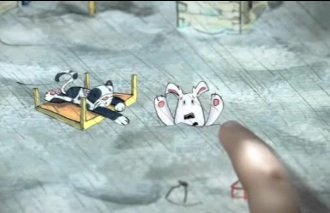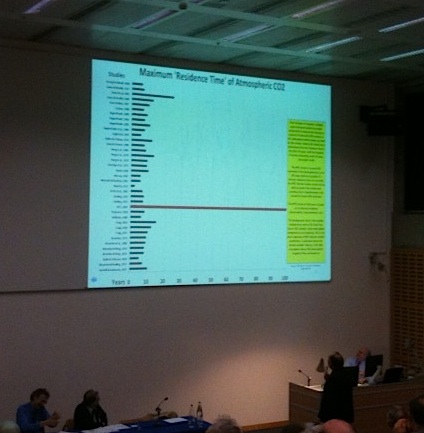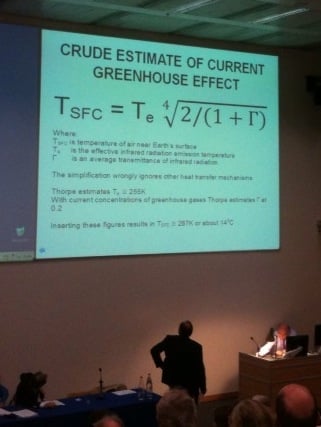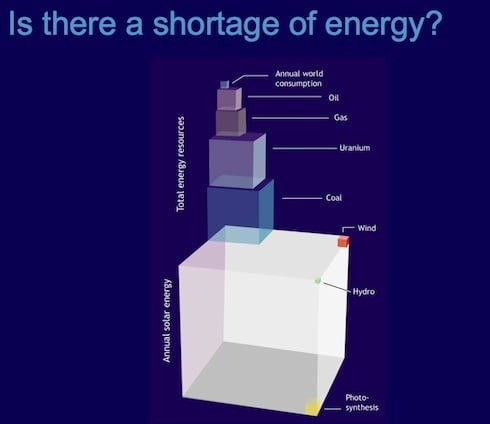Original URL: https://www.theregister.com/2009/10/30/climate_fools_day/
Climate Fools Day rallies the heretics
Stop them, before they Deny again!
Posted in Science, 30th October 2009 10:56 GMT
On my way to a climate conference yesterday, I wondered what £6m worth of TV advertising might look like if it climate sceptics dominated the political and media elites, rather than environmental activists. This campaign would obviously be targeted at the small minority of people who think that their lifestyles affect the climate.
Perhaps creatives could come up with a 'Numptie' Family - who run around the house turning off lights, spend hours doing recycling, demand to eat vegetarian food, and send back their energy bills because they're not high enough. The message would be don't waste your time on pointless activities. The tag line could "Don't be a Numptie".
I expect that this would become a national sensation, (but perhaps not with Guardian readers,) and possibly even generate spin-offs. It would surely draw fewer complaints than the current £6m "behaviour change" campaign featuring the drowning cartoon dog.

It would certainly meet with approval from most attendees of Piers Corbyn's "Climate Fool's Day" conference yesterday. There, at Imperial College, the air was thick with heresy.
The BBC sent two employees - who strangely, put as much distance between themselves and the "Deniers" as they could. If they were any further back from the stage, they would have been in the next room. A Freudian choice of seating? At Fools Day, almost every foundation of the manmade global warming hypothesis was attacked - including the views of other sceptical scientists.
This may be somewhat confusing to an agnostic. There's a great hunger for a 'silver bullet' to slay the Greenhouse Global Warming hypothesis, when none is really necessary. A hypothesis will die a natural death, if it is no longer an adequate explanation of the observations. No amount of financial or political buttress - or as a last resort, the precautionary principle - can prop up a bad theory forever.
The many cases against
What we got was a mixed bag.
WeatherAction's Piers Corbyn, who organised the gathering, sounded optimistic. He compared the struggle to overturn the manmade warming orthodoxy to John Harrison's struggle to get his revolutionary marine timepieces accepted by the scientific establishment.
"The science establishment refused to accept it. The politicians didn't care. But the Navy did care - he saved lives. It took decades to be recognized, but it's why we're here speaking English - people could navigate better."
"Today the science establishment is obsessed with CO2 - and politicians are mostly telling scientists what to do. But as with Harrison, users are going to win. It's the farmers, the people who are hit by typhoons."
"Once we've disproved the CO2 theory, there's not much need to debate why it doesn't work."
Corbyn, and those who followed, focussed on the poor historical correlation between CO2 and temperature.
Peter Gill of the Energy Institute (speaking for himself, he stressed) said that the CO2 record has its own 'Hockey Stick' - a reference to the forgery of the earth's temperature record by academics keen to change public policy in a specific direction. He claimed that G S Callendar, the father of global warming, only used one per cent of the data in estimating pre-industrial CO2 levels, producing a figure of 270ppm. More recently, a German called E G Beck had used more data, and came up with 335ppm for the same period. This is highly contentious.
Gill said that for most of the earth's history, CO2 had been higher - only in the Late Carboniferous to Early Cambrian periods was the CO2 level as low as it is now.
The strongest proposition to undermine the hypothesis is that CO2 has a far shorter lifetime in the atmosphere than the behaviour change lobby presume. Gill said most studies prior to 1983 had suggested it was between four and fourteen years. The IPCC "consensus view" is that it's over a hundred years. (You may recall Freeman Dyson here suggested it's twelve years.) I'm guessing Gill borrowed from this paper by Tom Segalstad.

CO2's atmospheric lifespan: one of these estimates is not like the others
He had an interesting calculation I hadn't heard before. The human contribution to CO2 is 26 gigatons a year. It's peaked in the past, however. Assuming all that was anthropogenic, between 1820 and 1855 the peak was 44gt a year and between 1942 and 1953 78 gigatons a year. Where did it go, he asked? If the lifespan was anything like the "consensus" supposes, this would still be hanging around. He concluded that "the variability of emission and absorption by natural processes exceeds current anthropogenic emissions."
So far nobody had challenged the absorption properties of CO2 which go unchallenged in the laboratory. Then a retired analytic chemist called Hans Schreuder did just that. "Infrared sensitive gases release and do not trap infrared energy" he said. "CO2 can't cause warming."

Peter Gill
Professor Philip Hutchinson of Cranfield University, who followed, took a swipe at both Peak Oil ("another handy scare story") and global warming. I've pinched a couple of his slides from another of his presentations. One illustrates the potential energy available to us if we can exploit it.
He warned of the dangers of energy security. For the UK, with its nuclear capacity declining, policy was now a case of "Faith, Hope and Charity."
"Faith in renewables, Hope that the Middle East remains stable and Russian doesn't turn off the Gas Tap, and Charity from other countries that have been more prudent, such as France".
It's hard to express British energy policy more succinctly.So what did he recommend?
A short-term fix was coal - "the only potential solution to avoid Brownouts after 2015", he said. He also recommended expanding nuclear capacity. Long term, Hutchinson predicted that liquid hydrocarbons from coal would secure our energy future, as long as we could trade with the suppliers.
"I profoundly dissent from the Green view that technology is bad for you, we should learn to live with the environment, and just sit around and wait for the next extinction event," he said. "It's just a silly idea. We've progressed by not doing that."
"We've progressed by amending the environment to make us more comfortable. Most of Southern England was a swamp 2000 years ago," he pointed out - and man had drained it. "I much prefer Southern England now than some dank, woody, dreary swamp."
Via a weblink, Joe D'Aleo summarized many of the sceptics arguments succinctly - although technical difficulties left him inaudible at times. The strongest of these is the point made by MIT's Richard Lindzen, arguably the most senior climate scientist in the world. Lindzen doesn't dispute the energy budget model, and doesn't dispute the properties of CO2. But he says that the feedbacks required for "runaway" warming are theoretical, and without feedbacks the warming is around half a degree Centigrade. The implication is that we've seen all the warming we'll ever see from CO2.
Ulster MP Sammy Wilson gave a brief twelve minute cameo explaining his doubts about the orthodoxy. He told of his pride in being named in George Monbiot's list of "Top Ten Climate Deniers".
Enter Harrabin
I'd mentioned the presence of the BBC earlier - which included the BBC's eco-activist (officially "environmental analyst") Roger Harrabin. He had founded the Cambridge Media and Environment Programme (CMEP), which gives seminars to BBC reporters on how to report environmental issues - which led to the unprecedented (in peacetime) decision to drop objectivity in reporting of climate change. A man with a mission.
True to form, Harrabin asked a question dripping with contempt - "I understand your reluctance to blame humans," he began, adding an appeal to authority - that lots of people disagreed with the sceptics. He asked: "Is the panel utterly relaxed about ocean acidification as it is over Global Warming?" Gill replied that coral forms during warmer periods - so yes, he was quite relaxed.
Harrabin actually got a warm round of applause just for turning up - attendees were far kinder to the BBC man than he was to them. Later that afternoon, Radio 4 broadcast Harrabin's summary of proceedings.
He priority seemed to be to soothe an anxious nation.
"The debate moved on [our emphasis] a couple of years ago," but "some people were left outside that consensus and they're here today," he began.
Corbyn said the IPCC had looked at the scientific evidence with "their eyes closed" - ignoring or downplaying anything that contradicted greenhouse gas as the primary factor.
"That's quite an accusation - they're reputable," countered Harrabin, again making an appeal to authority. He introduced a climate modeller - Joanna Haigh - who seemed to make Corbyn's point for him - admitting they hadn't taken account of solar particles or electro magnetic influences, because they didn't think they'd be significant.
Harrabin ended with yet another appeal to authority:
"It's clear there is a lot of uncertainty about the future climate, but the world's politicians who'll be meeting soon in Copenhagen have decided that continuing with the planetary experiment of increasing CO2 [our emphasis] to see how the world responds is probably not a prudent course."
Satisfied that he'd extinguished all unsafe thoughts, Middle England was prepared for the next Met Office weather forecast. ®
